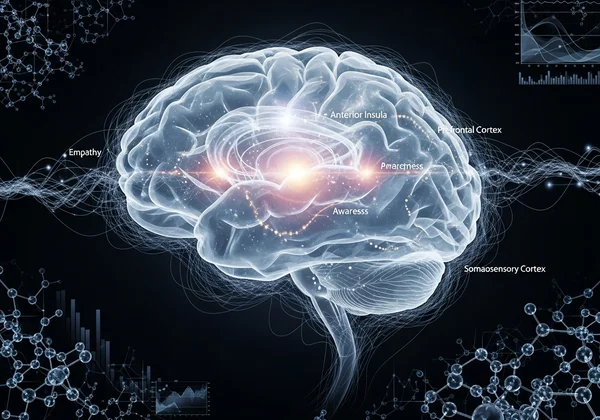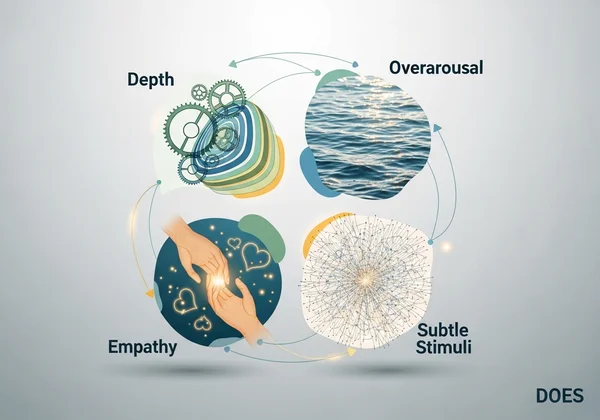The Ultimate HSP Test Guide: Discover Your High Sensitivity
September 15, 2025 | By Eleanor Reed
Do you often feel things more deeply than others? Are you easily overwhelmed by loud noises, bright lights, or busy environments? If you've ever been told you're "too sensitive" or find yourself needing extra downtime to recharge, you're not alone. You might be a Highly Sensitive Person (HSP), a distinct and normal personality trait recognized by science. This ultimate HSP guide is designed to introduce you to the world of high sensitivity, helping you understand this powerful trait and how it shapes your life. For those wondering, am I a highly sensitive person?, this is your starting point for clarity and self-discovery.
Understanding your sensitivity is the first step toward embracing it. This comprehensive guide will walk you through the science, characteristics, and strengths of being an HSP. Ready to explore your inner world? You can begin your journey with our free HSP test to gain initial insights.
What is a Highly Sensitive Person (HSP)?
A Highly Sensitive Person is someone who has a more attuned and reactive central nervous system. This trait, formally known as Sensory Processing Sensitivity (SPS), means that HSPs process physical, emotional, and social stimuli more deeply than the average person. It's estimated that 15-20% of the population possesses this trait, making it a significant minority. It’s an innate trait, meaning you are born with it, and it occurs equally in all genders.
Being an HSP isn't about being weak or fragile; it's about having a finely tuned internal system. Think of it like a high-fidelity sound system that picks up every subtle note in a piece of music, whereas a standard system might miss them. This heightened awareness can be a source of great strength, but it can also lead to feeling overstimulated in a world not always designed for sensitivity.

The Origin of High Sensitivity: Dr. Elaine Aron's Research
The concept of the Highly Sensitive Person was pioneered by psychologist and researcher Dr. Elaine Aron in the 1990s. Through her extensive research, she identified SPS as a distinct personality trait, not a condition to be fixed. Her work has provided a scientific framework for millions of people to finally understand their experiences, moving from self-doubt to self-acceptance.
Dr. Aron’s research established that high sensitivity is a biological difference. Brain imaging studies have shown that HSPs exhibit more activity in brain areas related to empathy, awareness, and the processing of sensory information. This scientific validation is crucial because it confirms that being highly sensitive is a real and legitimate way of being in the world. For those seeking a reliable assessment, an Elaine Aron hsp test is the best place to start.

Is Being Highly Sensitive a Disorder or a Trait?
One of the most important distinctions to make is that high sensitivity is a personality trait, not a disorder. It is not listed in the Diagnostic and Statistical Manual of Mental Disorders (DSM-5). While the experience of being overstimulated can sometimes lead to anxiety or stress if not managed well, the trait itself is not a mental illness. It’s not something to be cured but rather something to be understood and integrated into your life.
Confusing HSP with conditions like social anxiety, ADHD, or autism is common, but they are fundamentally different. High sensitivity is about the depth of processing information. Recognizing it as a neutral trait is the first step toward harnessing its many advantages. Understanding this difference is key to self-acceptance and learning how to thrive with your unique temperament.
Key Characteristics of Highly Sensitive People
While every HSP is unique, Dr. Aron identified four core characteristics that define the trait. She created the acronym DOES to describe them. If you identify strongly with all four of these aspects, there's a high probability you are an HSP.

The DOES Model Explained: Depth, Overarousal, Empathy, Subtle Stimuli
Understanding The DOES Model explained by Dr. Aron provides a clear roadmap to the HSP experience. Let's break down each component:
- D - Depth of Processing: HSPs think deeply about everything. Before making a decision, they will weigh all possible outcomes and reflect on past experiences. This can make decision-making slower, but it often leads to more thoughtful and wise choices. They process information on a more profound level, connecting and comparing it to other data.
- O - Overarousal (or Overstimulation): Because their nervous systems are so attuned, HSPs are more easily overwhelmed by high levels of stimulation. A crowded mall, a loud concert, or a chaotic work environment can quickly become too much. This isn't a choice; it's a physiological response to an influx of sensory data that leads to feeling frazzled and needing to withdraw.
- E - Emotional Responsiveness & Empathy: HSPs feel emotions, both positive and negative, very intensely. They also have a remarkable capacity for empathy, often sensing the feelings of others as if they were their own. This strong emotional response is linked to highly active mirror neurons in the brain.
- S - Sensitivity to Subtle Stimuli: This refers to an awareness of the small details that others might miss. An HSP might notice a slight change in a friend's tone of voice, the subtle scent of perfume in a room, or the nuanced flavors in a meal. This attunement to subtlety makes them highly perceptive and intuitive.
Common Signs and Experiences of an HSP
Beyond the DOES model, there are many common signs and experiences that resonate with Highly Sensitive People. Do any of these sound familiar to you?
- You are deeply moved by art, music, or nature.
- You have a rich and complex inner life.
- You feel a strong need for downtime, especially after a busy day, to retreat to a quiet, private space.
- You are highly conscientious and strive to do things correctly.
- You startle easily to sudden noises or movements.
- You are sensitive to the effects of caffeine and other stimulants.
- As a child, you may have been described as shy or sensitive by parents and teachers.
If you find yourself nodding along to this list, it may be a strong indicator of the trait. The most definitive way to know for sure is to take an official hsp test.
Embracing & Leveraging Your High Sensitivity
For too long, sensitivity has been framed as a weakness. The truth is, embracing your high sensitivity is about recognizing it as a superpower. When you understand your trait, you can learn to manage its challenges and leverage its incredible strengths to build a life that is authentic and fulfilling.
The Unique Strengths of Highly Sensitive Individuals
The same nervous system that makes you prone to overwhelm also endows you with a host of unique strengths. Many HSPs find they excel in roles that require creativity, compassion, and attention to detail. Some of these strengths include:
-
Deep Empathy: Your ability to feel what others are feeling makes you an incredibly supportive friend, partner, and colleague.
-
High Creativity: With a rich inner world and an appreciation for subtlety, many HSPs are naturally drawn to the arts and innovative thinking.
-
Exceptional Intuition: By processing information so deeply, you often develop a strong gut feeling about situations and people, which can be a reliable guide.
-
Greater Conscientiousness: Your tendency to reflect before acting means you are often diligent, responsible, and thoughtful in your work and relationships.
-
Appreciation of Beauty: You find immense joy and meaning in the beauty around you, from a piece of art to a sunset, enriching your daily life.

Navigating Challenges: Overwhelm & Setting Boundaries
Of course, being an HSP also comes with challenges. Navigating challenges like overstimulation is a crucial skill. The key is not to avoid stimulation altogether but to learn how to manage it. This involves creating a lifestyle that honors your sensitive nature.
Setting firm boundaries is essential. This means learning to say "no" to social invitations when you feel drained, scheduling regular quiet time into your day, and creating a calming home environment. It's not selfish; it's self-preservation. Understanding your limits and communicating them clearly allows you to engage with the world on your own terms, preventing burnout and allowing your strengths to shine. A deeper understanding from a hsp personality test can provide personalized strategies.
Discover Your Unique Sensitivity & Thrive
Understanding high sensitivity is a journey of self-discovery that can transform your life. It's about reframing what you may have seen as a flaw into one of your greatest assets. By recognizing your trait, embracing its strengths, and learning to manage its challenges, you can live a rich, meaningful, and authentic life.
Are you ready to take the next step? The path to self-understanding starts with a single click. Discover your sensitivity by taking our free, comprehensive HSP test, based on the foundational research of Dr. Elaine Aron. You can also opt for a personalized AI-driven report for even deeper insights into your unique profile.
Frequently Asked Questions About High Sensitivity
What are the core characteristics of a highly sensitive person?
The core characteristics are summarized by the acronym DOES: Depth of processing (thinking deeply), Overarousal (getting easily overwhelmed), Emotional responsiveness and empathy (feeling things intensely), and Sensitivity to subtle stimuli (noticing small details).
Is HSP a mental disorder or a personality trait?
HSP is a normal, innate personality trait, not a mental disorder. It is a biological difference in how the nervous system processes information. While it can co-exist with conditions like anxiety, it is not the cause and is not considered an illness.
How can I confirm if I am a Highly Sensitive Person?
While reading about the traits can provide clues, the most reliable way to confirm if you are an HSP is by taking a scientifically validated self-assessment. You can take a test for hsp on our website, which is based on Dr. Elaine Aron's research, to get a clear and insightful result.
What's the difference between HSP and introversion?
This is a common point of confusion. While about 70% of HSPs are introverts, 30% are extroverts. The key difference is that introversion is about where you get your energy (from being alone), while high sensitivity is about how you process information. An extroverted HSP enjoys social interaction but may get overstimulated more quickly than a non-HSP extrovert.
Where can I take an official HSP test to learn more?
You can take a comprehensive and reliable HSP test right here at HSPTest.org. Our test is designed to help you discover your level of sensitivity and offers an optional in-depth, AI-powered report to help you understand your results and learn how to thrive.